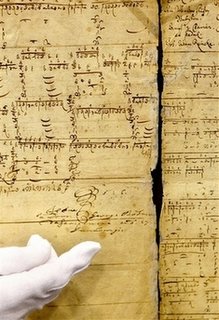 A restorer points to the signature of Johann Sebastian Bach on an original handwritten music script of the composer, during a press conference in Weimar, eastern Germany, Thursday, Aug. 31, 2006. The document, along with another script recently recovered in the Anna Amalia Library in Weimar dates around 1700 and is classified as the oldest handwritten music script of Bach. (AP Photo/Jens Meyer)
A restorer points to the signature of Johann Sebastian Bach on an original handwritten music script of the composer, during a press conference in Weimar, eastern Germany, Thursday, Aug. 31, 2006. The document, along with another script recently recovered in the Anna Amalia Library in Weimar dates around 1700 and is classified as the oldest handwritten music script of Bach. (AP Photo/Jens Meyer)W EIMAR, Germany. Thu Aug 31, 12:34 PM ET (JOCHEN WIESIGEL, AP).- The oldest known manuscripts of Johann Sebastian Bachhandwritten copies of works by two other composers — have been discovered in a library that was heavily damaged in a fire two years ago, researchers said Thursday.
The two manuscripts date from around 1700 and contain copies Bach made of organ music composed by Dietrich Buxtehude and Johann Adam Reinken, said Hellmut Seemann, president of the Foundation of Weimar Classics.
Researchers found the documents in the archives of the Duchess Anna Amalia library in Weimar, where a previously unknown aria by Bach was discovered last year.
The library, housed in a 16th century palace, was badly damaged by a fire in September 2004. While some 50,000 books were lost, the Bach manuscripts survived because they had been stored in the vault.
The foundation said the discovery provided vital clues about Bach's early development. He was a 15-year-old schoolboy when he copied the two chorale fantasias — "Nun freut euch, lieben Christen gmein" by Buxtehude and "An Wasserfluessen Babylon" by Reinken.
It said Bach attached a note to the Reinken copy that confirmed he was studying at the time with the organist Georg Boehm in the north German town of Lueneburg.
The manuscripts were found together with two previously unknown fantasias by Johann Pachelbel, copied by Bach's student Johann Martin Schubart.

Restorer Nanett Woithe shows documents written by German composer Johann Sebastian Bach (1685-1750) in the eastern German city of Weimar August 31, 2006. These are the earliest handwritten originals by Bach found during restorations in Weimar and shows his transcriptions of organ works by Dietrich Buxtehude (1637-1707) and Johann Adam Reinken (1643-1722). REUTERS/Tobias Schwarz (GERMANY)
"Technically highly demanding, these organ works document the extraordinary virtuoso skills of the young Bach as well as his efforts to master the most ambitious and complex pieces of the entire organ repertoire," the foundation said.
It said the find also made clear that Bach went to Lueneburg in order to learn more about the influential North German organ school in Hamburg and Luebeck.
Schubart succeeded Bach as organist at the court of Weimar in 1717, and the newly discovered documents were passed to the library as part of Schubart's estate, the foundation said.
Both the manuscripts and the aria found last year were unearthed by researchers from the Bach Archiv foundation in Leipzig, who have been combing German archives for information about the composer since 2002.
The manuscripts will be exhibited at the library from Sept. 1 and at the Bach Archiv in Leipzig from Sept. 21.










